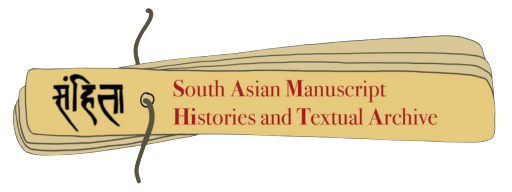Manuscripts
Search Filter
Ādityahṛdaya; Gaṅgālaharī; Gītagovinda, Gṛhyaprakaraṇa; Grahaṇanirṇaya; Grahārāmakutūhala,Candrārkī, Janmapatra; Janmapatrī; Tājikaabhūṣaṇa
ark:/12148/btv1b10082690t Language : Sanskrit Scripts : Devanagari
This is a composite manuscript. Manuscripts like Vedic , Śiva stotra, Kāvya,Jyotiṣa .
Mahābhārata Karṇaparva
ark:/12148/btv1b100831262 Language : Sanskrit Scripts : Bangali
This parva is is the eighth of eighteen parva.Karṇaparva describes the appointment of Karṇa as the third commander-in-chief of the Kaurava alliance. The Parva recites how war begins to tire and frustrate everyone. This book describes how brutal war leads to horrifying behavior over the 16th and 17th day of the 18-day Kurukṣetra War. .Karṇaparva includes a treatise by Aśvatthāmā which focuses on the motive of the deeds of human life. The crowning incident of this Parva is the final confrontation between Karna and Arjuna, in which Karna is killed.
Mahābhārata Ādiparva
ark:/12148/btv1b100832072 Language : Sanskrit Scripts : Bangali
This parva is is the first of eighteen."Ādi" means "first". This chapter mainly describes India and describes the kings who ruled and the affairs of their state. As the name suggests, in Ādi Parva all external events are revealed.di Parva describes how the epic came to be recited by Ugrasrava Sauti to the assembled rishis at the Naimisha Forest after first having been narrated at the sarpasatra of Janamejaya by Vaishampayana at Taxila.
Mahābhārata Śāntiparva
ark:/12148/btv1b10083123q Language : Sanskrit Scripts : Bangali
This is a Mahābhāratas śāntiparva manuscript. This parva is twelfth of eighteen parva .This Parva traditionally has 3 sub-parvas,Rājadharma, Apaddharma-anusasana . Mokṣadharma. But In this manuscript Dānadharma chapter is included. The text describes the duties of kings and leaders, among other things, behavior and rules to achieve moksha (emancipation, release, freedom).
Mahābhārata Śāntiparva
ark:/12148/btv1b100831228 Language : Sanskrit Scripts : Bangali
This is a Mahābhāratas śāntiparva manuscript. This parva is twelfth of eighteen parva .This Parva traditionally has 3 sub-parvas,Rājadharma, Apaddharma-anusasana . Mokṣadharma. But In this manuscript Dānadharma chapter is included. The text describes the duties of kings and leaders, among other things, behavior and rules to achieve moksha (emancipation, release, freedom).This is the continuation of the previous manuscript (text).
Mahābhārata Virāṭaparvan.
ark:/12148/btv1b10083186j Language : Sanskrit Scripts : Bangali
This is a fourth of eighteen Parva. It discusses the 13th year of exile which the Pandavas must spend incognito to avoid another 12 years of exile in the forest. They do so in the court of Virata.Yudhishthira assumes the identity of game entertainer to the king and calls himself Kanka, Bhima of a cook Ballava, Arjuna teaches dance and music as eunuch Brihannala and dresses as a woman, Nakula tends horses as Granthika, Sahadeva herds cows as Tantipala, and Draupadi in the name of Malini went as Sairandhri to queen Shudeshna. It has 4 sub-parvasPandava Pravesha Parva, Kichaka-vadha Parva,Go-harana Parva,Vaivahika Parva.
Yogaśāstra
ark:/12148/btv1b10083947c Language : Sanskrit Scripts : Granta
It is a treatise on the "rules of conduct for laymen and ascetics", where in "yoga" means "ratna-traya" (three jewels), i.e. right belief, right knowledge and right conduct for a Svetambara Jain. As a manual with an extensive auto-commentary called Svopajnavrtti, it was instrumental to the survival and growth of Svetambara tradition in western Indian states such as Gujarat and the spread of Sanskrit culture in Jainism.
Taddhitaprakriyā
ark:/12148/btv1b10084030r Language : Sanskrit Scripts : Nagra script
In Sanskrit grammar there is a Taddhita prakaraṇa. Taddhita means suffixes. Sanskrit has many different kinds of suffixes. Verb and nominal endings are all suffixes. So are the suffixes that turn verb roots into verb stems.
Sārasvataṭīkā
ark:/12148/btv1b53148158h Language : Sanskrit Scripts : Devanagari
This is a Puñjarājas commentary on Sàrasvata Prakriya. It is a grammar text written by Anubhūti Svarūpācārya[1] between 1250 and 1450.
Rasavatīvṛtti
ark:/12148/btv1b10082575v Language : Sanskrit Scripts : Devanagari
This is a commentary on Saṅkṣiptasāra of Kramadīśvara. TThis is a grammar text.
Rasendrakalpadruma
ark:/12148/btv1b10082559t Language : Sanskrit Scripts : Bengali
Rasendrakalpadruma by Rāmakṛṣṇa Bhaṭṭa son of Nīlakaṇṭha Bhaṭṭa.1003 This work is variously described: it consists of two sections (kanda), divided into several chapters (adhyaya); the first section (rasakanda) is about alchemical processes, and the second (prayogakanda) about the employment of inorganic compounds in various diseases. Rāmakṛṣṇa Bhaṭṭa wrote an auto-commentary, called Vaidyaratnakara, on his Rasendrakalpadruma
Smaradīpikā
ark:/12148/btv1b100831658 Language : Sanskrit Scripts : Bengali
This manuscript contains a treatise on erotics. Its title, the Smaradīpikā, and its author, Mīnanātha, are given in both the introductory stanzas at the beginning and in the completion statement at the end. However, the text here is not at all the same as the published edition of 1967. The first line is roughly equivalent, and there are occasional parallels, but by the end they are completely different. According to an annotation on the title page, this manuscript was part of the collection of a certain Ouessant from Pondicherry, although it does not appear in the list of manuscripts acquired from him by the library.













